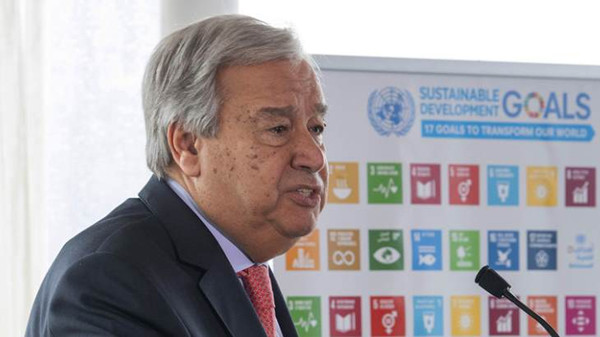UN chief calls for more action on climate change
Without greater leadership and ambition, the world risks crossing the point of no return on climate change, United Nations Secretary-General António Guterres has warned.

Guterres speaking at the UN headquarters yesterday (Image: UN/Eskinder Debebe)
In a speech given yesterday at the UN headquarters in New York, Guterres said: "Climate change is the defining issue of our time - and we are at a defining moment. We face a direct existential threat. Climate change is moving faster than we are - and its speed has provoked a sonic boom SOS across our world."
The Paris Climate Change Agreement, which aims to keep global temperature increases this century well below 2ºC, and to drive efforts to limit temperature increases to below 1.5ºC , was adopted in December 2015 at the 21st conference of the parties (COP21) to the United Nations Framework Convention on Climate Change held in Paris. It entered into force in November 2016.
Guterres said these targets were "really the bare minimum" to avoid the worst impacts of climate change. The commitments made so far by parties to the Paris Agreement represent just one-third of what is needed, he added.
"If we do not change course by 2020, we risk missing the point where we can avoid runaway climate change, with disastrous consequences for people and all the natural systems that sustain us. That is why, today, I am appealing for leadership - from politicians, from businesses and scientists, and from the public everywhere. We have the tools to make our actions effective. What we still lack - even after the Paris Agreement - is the leadership and the ambition to do what is needed.
"Put simply, we need to put the brake on deadly greenhouse gas emissions and drive climate action. We need to rapidly shift away from our dependence on fossil fuels. We need to replace them with clean energy from water, wind and sun.
"Technology is on our side in the battle to address climate change," Guterres suggested. "The rise of renewable energy has been tremendous."
The world will invest some USD90 trillion in infrastructure over the next decade or so. "We must ensure that that infrastructure is sustainable or we will lock in a high-polluting dangerous future," he said.
"Existing technologies are waiting to come online - cleaner fuels, alternative building materials, better batteries and advances in farming and land use. These and other innovations can have a major role in reducing greenhouse gas emissions, so we can hit the Paris targets and inject the great ambition that is so urgently needed. Government must also end harmful subsidies for fossil fuels, institute carbon pricing that reflects the true cost of polluting greenhouse [gas] emissions and incentivises the clean energy transition."
Guterres announced that he will convene a Climate Summit in September 2019 "to bring climate action to the top of the international agenda". He noted the summit will come exactly one year before countries have to enhance their national pledges under the Paris Agreement. "I want to hear about how we are going to stop the increase in emissions by 2020, and dramatically reduce emissions to reach net-zero emissions by mid-century."
Don't forget nuclear
World Nuclear Association welcomed Guterres' call for action to reduce greenhouse gas emissions but said he had failed to recognise nuclear energy as a vital component needed to achieve this.
"The large-scale reliable output of nuclear energy enables decarbonisation, not only to meet current electricity demand, but also in sectors such as transport and water desalination," the Association noted.
The recent Massachusetts Institute of Technology report, The future of nuclear energy in a carbon-constrained world, concluded that realising nuclear energy's potential is essential to achieving a deeply decarbonised energy future in many regions of the world.
World Nuclear Association Director General Agneta Rising said: "Nuclear generation stands ready to help the world take the low-carbon path. We call on UN Secretary General António Guterres to show support for all technologies that can help tackle climate change. There is no sustainable energy future without nuclear."
The nuclear industry has set the Harmony goal for nuclear energy to provide 25% of global electricity by 2050. This will require a tripling of nuclear generation from its present level. Some 1000 GWe of new nuclear generating capacity will need to be constructed by then to achieve that goal. World Nuclear Association has identified three areas for action to achieve this: establishing a level playing field in electricity markets, building harmonised regulatory processes, and an effective safety paradigm.
- China Institute of Atomic Energy
- Nuclear Power Institute of China
- Southwestern Institute of Physics
- China Nuclear Power Operation Technology Corporation, Ltd.
- China Nuclear Power Engineering Co., Ltd.
- China Institute for Radiation Protection
- Beijing Research Institute of Uranium Geology (BRIUG)
- China Institute of Nuclear Industry Strategy (CINIS)
- China Nuclear Mining Science and Technology Corporation


